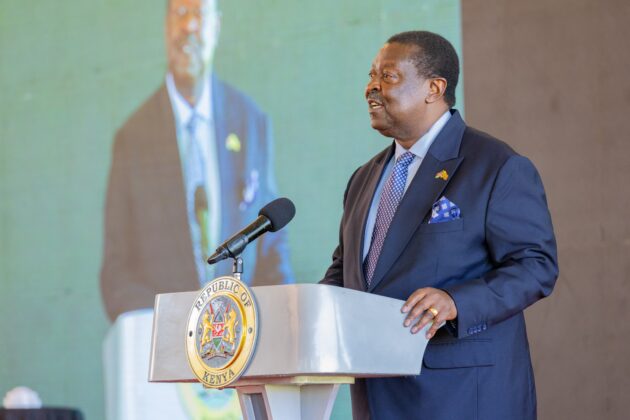
Kenya denies backing RSF, accuses Sudan junta of undermining democracy » Capital News
NAIROBI, Kenya, Feb 20 – Kenya on Tuesday defended a controversial meeting in Nairobi led by Sudan’s paramilitary Rapid Support Forces (RSF), describing it as a nonpartisan platform for dialogue and rejecting accusations of taking sides in the ongoing Sudanese conflict.
In a statement issued Wednesday,the Ministry of Foreign Affairs reaffirmed Kenya’s commitment to facilitating peaceful resolutions to regional conflicts even as it accused Sudan’s military of undermining democratic progress in the war-torn country.
Prime Cabinet Secretary Musalia Mudavadi emphasized Kenya’s dedication to regional peace and stability while dismissing claims of bias in hosting Sudanese civilian and RSF representatives.
He also noted that Sudanese groups have previously sought mediation in neighboring countries, arguing that Nairobi is merely providing a platform for dialogue, as other regional states have done in the past.
“We note that this is not the first time groups in Sudan have sought solutions to their crisis by leveraging the good offices of neighboring countries,” Mudavadi stated.
“Indeed, in January 2024, parties and stakeholders to the Sudanese conflict met in a neighboring country to chart a way forward on inclusive dialogue and the return to civilian rule.”
Criticism
The RSF meeting in Nairobi, attended by Sudanese civilian and armed groups, has sparked criticism from Sudan’s military leadership, which views it as an endorsement of the paramilitary force in the ongoing war.
However, Mudavadi insisted that Kenya’s involvement is guided by its longstanding peacekeeping role in the region, asserting that Nairobi has no hidden agenda.
“When Kenya offers this space, it is without any ulterior motives. It is because we believe there is no military solution to political disputes,” he stated, referencing Kenya’s history of hosting peace negotiations, including the Machakos Protocol of 2002, which helped end Sudan’s second civil war.
He explained that the RSF and Sudanese civilian groups’ presentation of a roadmap and proposed leadership in Nairobi aligns with Kenya’s peace negotiation role, which is to provide nonpartisan platforms for conflict parties to seek resolutions.
Mudavadi also raised concerns over the worsening humanitarian crisis in Sudan, describing it as one of the world’s worst ongoing conflicts, with over 11 million people displaced, most of them women and children.
He noted that neighboring countries, including Kenya, are bearing the brunt of the refugee crisis, further straining already overstretched humanitarian resources.
“The crisis in Sudan demands urgent regional and global attention,” he emphasized, revealing that Kenya has committed $2 million to humanitarian efforts aimed at alleviating suffering in the war-ravaged nation.
Unconstitutional change
Reaffirming Kenya’s commitment to democracy, Mudavadi aligned the country’s stance with the African Union (AU) Charter on Unconstitutional Change of Government, recalling the AU’s 2021 decision to suspend Sudan following the military coup.
Kenya, he added, stands in solidarity with the people of Sudan as they navigate their political future through dialogue, vowing that Nairobi will continue working with regional and international partners—including IGAD and the AU—to facilitate peace efforts.
“As a country, we remain ready, individually and collectively, to support any efforts agreed upon by the people of Sudan in ensuring stability and prosperity for their nation and the entire Horn of Africa region,” he said.
Sudan’s military leadership has strongly opposed the RSF-led meeting in Nairobi, viewing it as an attempt to legitimize the paramilitary group, which has been locked in a brutal power struggle with the army since April 2023.
Parallel government
Kenya’s response came a few hours after the RSF’s legal advisor clarified that their convention with allied factions in Nairobi is not aimed at forming a parallel government or signing any agreements.
Instead, it seeks to establish proposals to address the root causes of Sudan’s crisis and ultimately end the war.
Ezzeldin Al Safi, the RSF commander’s legal advisor, said they would return to Sudan when the time comes to form a government, emphasizing that the RSF has no intention of governing externally.
“I would like to stress that we are not here to form a government, not in Kenya or elsewhere outside Sudan. When it comes to the decision to form a government, absolutely, we will go back to Sudan where the Sudanese people will decide,” Al Safi said.
“This is a facilitation and convening area where we genuinely want to come together peacefully and address the root causes of the problem,” he added.
Al Safi defended the decision to hold the negotiations in Kenya, citing the historical 2005 meeting, which led to more than a decade of peace, as a precedent.
He emphasized that Kenya is merely providing neutral ground for facilitation and dialogue.
“Previously, the state of Kenya welcomed the Sudanese in 2005, marking the end of one of the bloodiest wars between South and North Sudan. We are following the footsteps of our previous leaders who came together to help solve Sudan’s problems. Right now, we want to end all wars in Sudan,” he said.